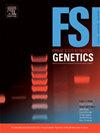具有欧洲血统的澳大利亚人口中身份信息遗传标记的特征。
IF 3.2
2区 医学
Q2 GENETICS & HEREDITY
引用次数: 0
摘要
身份信息单核苷酸多态性(iiSNPs)是法医案件工作中用于人类身份鉴定和亲属关系测试的重要遗传标记,尤其是在 DNA 证据的质量和数量不适合常规短串联重复(STR)分析的情况下。本研究分析了代表澳大利亚欧洲血统人群的 105 份口腔样本,以确定等位基因频率,并对 94 个 iiSNPs 和 20 个 STRs 进行群体遗传分析。这些标记通过计算相关的法医统计数据进行评估,并检测是否偏离哈代-温伯格平衡和连锁平衡。在合并的 114 个身份信息标记的任何成对组合之间都没有观察到具有统计意义的连接,只有一个 STR 出现了偏离 Hardy-Weinberg 平衡的情况(D8S1179)。在该群体中观察到的匹配基因型的概率,STR 为 10-23,iiSNPs 为 10-38,组合身份信息标记物为 10-60,从而提高了在直接或间接匹配情况下计算似然比时区分个体的能力。此外,当从受损或具有挑战性的样本中提取出次优 STR 图谱时,iiSNPs 的加入将有助于鉴定,并有助于在家族或亲缘关系测试中与遗传亲属进行比较。本文章由计算机程序翻译,如有差异,请以英文原文为准。
Characterisation of identity-informative genetic markers in the Australian population with European ancestry
Identity-informative single nucleotide polymorphisms (iiSNPs) are valuable genetic markers for human identification and kinship testing in forensic casework, especially when the quality and quantity of DNA evidence is not suitable for routine short tandem repeat (STR) profiling. This study analysed 105 buccal samples representing the Australian population with European ancestry in order to assign allele frequencies and conduct population genetic analyses for 94 iiSNPs and 20 STRs. The markers were assessed by calculating relevant forensic statistics and testing for deviations from Hardy-Weinberg and linkage equilibrium. No linkage of statistical significance was observed between any of the pair-wise combinations of the combined 114 identity-informative markers and only one STR exhibited deviation from Hardy-Weinberg equilibrium (D8S1179). The probability of matching genotypes being observed within this population was of the order of 10−23 for STRs, 10−38 for iiSNPs and 10−60 for the combined identity-informative marker panel, improving the ability to discriminate between individuals when calculating likelihood ratios in direct or indirect matching scenarios. Further, the addition of iiSNPs will facilitate identifications when suboptimal STR profiles are recovered from compromised or challenging samples and aid comparisons to genetic relatives for familial or kinship testing.
求助全文
通过发布文献求助,成功后即可免费获取论文全文。
去求助
来源期刊
CiteScore
7.50
自引率
32.30%
发文量
132
审稿时长
11.3 weeks
期刊介绍:
Forensic Science International: Genetics is the premier journal in the field of Forensic Genetics. This branch of Forensic Science can be defined as the application of genetics to human and non-human material (in the sense of a science with the purpose of studying inherited characteristics for the analysis of inter- and intra-specific variations in populations) for the resolution of legal conflicts.
The scope of the journal includes:
Forensic applications of human polymorphism.
Testing of paternity and other family relationships, immigration cases, typing of biological stains and tissues from criminal casework, identification of human remains by DNA testing methodologies.
Description of human polymorphisms of forensic interest, with special interest in DNA polymorphisms.
Autosomal DNA polymorphisms, mini- and microsatellites (or short tandem repeats, STRs), single nucleotide polymorphisms (SNPs), X and Y chromosome polymorphisms, mtDNA polymorphisms, and any other type of DNA variation with potential forensic applications.
Non-human DNA polymorphisms for crime scene investigation.
Population genetics of human polymorphisms of forensic interest.
Population data, especially from DNA polymorphisms of interest for the solution of forensic problems.
DNA typing methodologies and strategies.
Biostatistical methods in forensic genetics.
Evaluation of DNA evidence in forensic problems (such as paternity or immigration cases, criminal casework, identification), classical and new statistical approaches.
Standards in forensic genetics.
Recommendations of regulatory bodies concerning methods, markers, interpretation or strategies or proposals for procedural or technical standards.
Quality control.
Quality control and quality assurance strategies, proficiency testing for DNA typing methodologies.
Criminal DNA databases.
Technical, legal and statistical issues.
General ethical and legal issues related to forensic genetics.

 求助内容:
求助内容: 应助结果提醒方式:
应助结果提醒方式:


